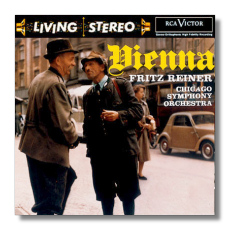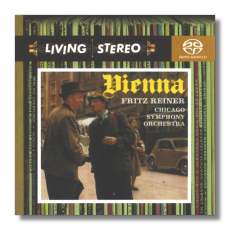
The Internet's Premier Classical Music Source
Related Links
-
Strauss Family Reviews
Weber Reviews - Latest Reviews
- More Reviews
-
By Composer
-
Collections
DVD & Blu-ray
Books
Concert Reviews
Articles/Interviews
Software
Audio
Search Amazon
Recommended Links
Site News
 CD Review
CD Review
Vienna

Waltzes and Polkas
- Josef Strauss: Waltz "Dorfschwalben aus österreich" (Villiage Swallows), Op. 164
- Johann Strauss Jr.:
- Waltz "Morning Papers", Op. 279
- Waltz "On The Beautiful Blue Danube", Op. 314
- Waltz "Thunder and Lightening", Op. 324
- Waltz "Vienna Blood", Op. 354
- Waltz "Roses from the South", Op. 388
- Waltz "Treasure", Op. 418
- Waltz "Emperor", Op. 437
- Richard Strauss: Waltzes "Der Rosenkavalier", Op. 59
- Carl Maria von Weber: Piece "Invitation to the Dance", J. 260 (Op. 65)
Chicago Symphony Orchestra/Fritz Reiner
RCA Living Stereo 09026-68160-2 ADD 77:20
Also released on Hybrid Multichannel SACD: Amazon - UK - Germany - Canada - France - Japan - ArkivMusic - JPC
"… Down with love…
Away, take it away
Give it back to the birds and the bees
And the Viennese… "
E.Y. "Yip" Harburg, "Down With Love"
(Music by Harold Arlen)
There are two times in each year when waltzing seems to be the thing: when the old year is rung out, and when your heart is wrung out. The latter time is upon us again, and what better time to review a new reincarnation of an old favorite? First there was a Red Seal CD, then a Gold Seal reissue. Now RCA has remastered and reissued "Vienna," which was recorded in 1957, for their nostalgia-laden Living Stereo series, and they've added four selections that Reiner and the Chicago SO taped in 1960.
Fritz Reiner could be a tight-fisted conductor, and while his tempos are suitable for mortals to dance to, his Johann Strauss makes one want to sit and admire more than it makes one want to get up and dance. Reiner's use of the Viennese hesitation - a slight lingering on the second beat of the measure, followed by a slight accent on the third – is very subtle; other conductors, some of them echt Viennese, have made much more of it. The music is moved along buoyantly; the word "efficiently" also comes to mind, although it implies that Reiner's conducting is mechanical or the subject of a time-motion study. That's not quite true, but his Strauss is less personal than many a conductor's. Having said that, there's lots to enjoy in these recordings, notably the perfection of the CSO's playing, and the warmth of the remastered sound. Of all the selections on this disc, I like the performance of Carl Maria von Weber's Invitation to the Dance best because it's the least typically Viennese work, and its brilliance plays to Reiner's strengths.
This reissue was produced by John Pfeiffer, who died last week. His death is particularly bad news to collectors who value RCA's massive back catalog, and who want to see more of it transferred to CD. It's not clear to me whether there is anyone at RCA who will drive these projects with the energy and dedication that he had.
Copyright © 1996, Raymond Tuttle




















